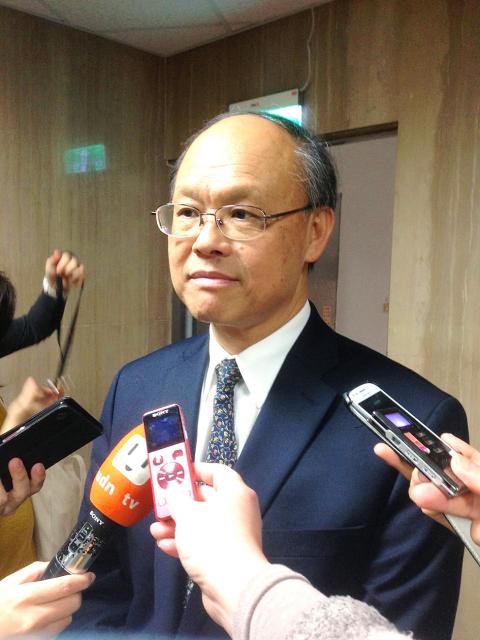The Ministry of Economic Affairs came under fire after a draft free-trade agreement between South Korea and China was revealed on Wednesday, as the tariff reductions proposed in the pact were not as significant as the ministry previously claimed.
Critics said that the Chinese Nationalist Party (KMT) administration exaggerated the impact of the pending treaty to coerce the public into supporting trade agreements between Taiwan and China.
They said that the ministry used the Beijing-Seoul deal as a “scare tactic” in an attempt to swing the vote in the KMT’s favor during last year’s nine-in-one elections.

Photo: CNA
In November last year, the ministry said that the pending Beijing-Seoul pact would deal a NT$650 billion (US$20.7 billion) blow to Taiwan’s economy and urged the nation to ratify the proposed cross-strait service trade agreement to mitigate the impact.
A KMT campaign advertisement leading up to the elections last year featured a woman dressed in traditional Korean garb who thanked the Democratic Progressive Party (DPP) for blocking cross-strait trade bills.
In contrast with the ministry’s earlier claims, Minister of Economic Affairs John Deng (鄧振中) on Wednesday said that the draft was “quite different” from the ministry’s previous expectations.
According to the Beijing-Seoul draft, tariffs for many industries considered key export industries for Taiwan will not be reduced significantly — including LCD panels, automobile parts, petrochemicals and machine tools.
Human rights lawyer and Economic Democracy Union convener Lai Chung-chiang (賴中強) yesterday said that the unveiled contents of the draft “shattered all sorts of exaggerated and unrealistic threats” by the KMT.
Lai said that the pending Beijing-Seoul agreement gradually lowers tariffs between the two nations over a buffer period of 20 years.
“Members of the public should not panic over the agreement,” Lai said.
Lai added that the transparent deliberation process of the pact could serve as an example for Taiwan, as both China and South Korea would be given another four months to conduct economic assessments of the draft before the treaty is ratified.
He said the “transparency mechanism” presented by the Beijing-Seoul treaty could serve as a lesson for the KMT administration in its interactions with China.
Tens of thousands of protesters took to the streets last year during the Sunflower movement, after a KMT legislator was perceived to ram through the proposed cross-strait service trade agreement while bypassing legislative deliberation.

Chinese Nationalist Party (KMT) Chairman Eric Chu (朱立倫), spokeswoman Yang Chih-yu (楊智伃) and Legislator Hsieh Lung-chieh (謝龍介) would be summoned by police for questioning for leading an illegal assembly on Thursday evening last week, Minister of the Interior Liu Shyh-fang (劉世芳) said today. The three KMT officials led an assembly outside the Taipei City Prosecutors’ Office, a restricted area where public assembly is not allowed, protesting the questioning of several KMT staff and searches of KMT headquarters and offices in a recall petition forgery case. Chu, Yang and Hsieh are all suspected of contravening the Assembly and Parade Act (集會遊行法) by holding

PRAISE: Japanese visitor Takashi Kubota said the Taiwanese temple architecture images showcased in the AI Art Gallery were the most impressive displays he saw Taiwan does not have an official pavilion at the World Expo in Osaka, Japan, because of its diplomatic predicament, but the government-backed Tech World pavilion is drawing interest with its unique recreations of works by Taiwanese artists. The pavilion features an artificial intelligence (AI)-based art gallery showcasing works of famous Taiwanese artists from the Japanese colonial period using innovative technologies. Among its main simulated displays are Eastern gouache paintings by Chen Chin (陳進), Lin Yu-shan (林玉山) and Kuo Hsueh-hu (郭雪湖), who were the three young Taiwanese painters selected for the East Asian Painting exhibition in 1927. Gouache is a water-based

Taiwan would welcome the return of Honduras as a diplomatic ally if its next president decides to make such a move, Minister of Foreign Affairs Lin Chia-lung (林佳龍) said yesterday. “Of course, we would welcome Honduras if they want to restore diplomatic ties with Taiwan after their elections,” Lin said at a meeting of the legislature’s Foreign Affairs and National Defense Committee, when asked to comment on statements made by two of the three Honduran presidential candidates during the presidential campaign in the Central American country. Taiwan is paying close attention to the region as a whole in the wake of a

OFF-TARGET: More than 30,000 participants were expected to take part in the Games next month, but only 6,550 foreign and 19,400 Taiwanese athletes have registered Taipei city councilors yesterday blasted the organizers of next month’s World Masters Games over sudden timetable and venue changes, which they said have caused thousands of participants to back out of the international sporting event, among other organizational issues. They also cited visa delays and political interference by China as reasons many foreign athletes are requesting refunds for the event, to be held from May 17 to 30. Jointly organized by the Taipei and New Taipei City governments, the games have been rocked by numerous controversies since preparations began in 2020. Taipei City Councilor Lin Yen-feng (林延鳳) said yesterday that new measures by